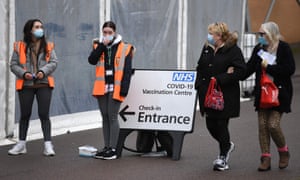
Leading vaccine scientists are calling for a rethink of the goals of vaccination programmes, saying that herd immunity through vaccination is unlikely to be possible because of the emergence of variants like that in South Africa.
The comments came as the University of Oxford and AstraZeneca acknowledged that their vaccine will not protect people against mild to moderate Covid illness caused by the South African variant. The Oxford vaccine is the mainstay of the UK’s immunisation programme and vitally important around the world because of its low cost and ease of use.
The findings came from a study involving more than 2,000 people in South Africa. They followed results from two vaccines, from Novavax and Janssen, which were trialled there in recent months and were found to have much reduced protection against the variant – at about 60%. Pfizer/BioNTech and Moderna have also said the variant affects the efficacy of their vaccines, although on the basis of lab studies only.Play Video0:47UK minister defends South Africa’s decision to pause rollout of Oxford Covid vaccine – video
All the vaccines, however, have been found to protect against the most severe disease, hospitalisation and death.
South Africa’s health minister, Zweli Mkhize, said in comments reported by Reuters on Sunday that the country would suspend use of the Oxford jab in its vaccination programme while scientists advised on the best way to proceed.
Shabir Madhi, professor of vaccinology at the University of the Witwatersrand who has been chief investigator on a number of vaccine trials in South Africa, including the Oxford one, said it was time to rethink the goals of mass Covid vaccination.
“These findings recalibrate thinking about how to approach the pandemic virus and shift the focus from the goal of herd immunity against transmission to the protection of all at-risk individuals in the population against severe disease,” he said.
The UK vaccines minister, Nadhim Zahawi, said the British public should maintain confidence in the Oxford jab, writing in the Telegraph that the vaccines being deployed “appear to work well against the Covid-19 variants currently dominant in the UK”.

He continued: “In terms of other variants, not in the UK, we need to be aware that even where a vaccine has reduced efficacy in preventing infection there may still be good efficacy against severe disease, hospitalisation, and death.”
Prof Andrew Pollard, chief investigator on the Oxford vaccine trial, emphasised the value of the vaccines in reducing the burden on health systems.
“This study confirms that the pandemic coronavirus will find ways to continue to spread in vaccinated populations, as expected, but, taken with the promising results from other studies in South Africa using a similar viral vector, vaccines may continue to ease the toll on health care systems by preventing severe disease,” he said.
Sarah Gilbert, professor of vaccinology at Oxford, said on the BBC’s Andrew Marr Show that even if vaccines do not bring down the numbers infected with variant strains, they save lives. “We may not be reducing the total number of cases but there’s still protection in that case against deaths, hospitalisations and severe disease,” she said.
“That’s really important for healthcare systems, even if we are having mild and asymptomatic infections. To prevent people going into hospital with Covid would have a major effect.”
Ravi Gupta, professor of clinical microbiology at the University of Cambridge, said that it was pragmatic to adopt the approach that vaccines will prevent severe disease and death rather than enabling herd immunity in countries like South Africa. To stop transmission – if it were possible – would mean delivering huge numbers of vaccine doses, which are not working so well, very rapidly.
“We probably need to switch to protecting the vulnerable, with the best vaccines we have which, although they don’t stop infection, they probably do stop you dying,” he said.

It was less of an issue for the time being in countries like the UK where vaccines were working and the immunisation programme was reaching millions. “Because we have better access to vaccines, we can be more ambitious but different countries pursue different strategies, then travel resumes and it may be very hard to stop these variants,” he said.
The vaccines perform better against the Kent variant. On Friday, the Oxford team published a study in pre-print, before peer review, showing efficacy dropped from an average of 84% to 75%.
All the vaccine developers are now working on tweaking their vaccines to increase efficacy against variants that have mutations in the spike protein. The protein, which attaches to human cells, is the target of most of the vaccines. Gilbert told the BBC on Sunday that “we have a version with the South African spike sequence in the works.
“It looks very likely that we can have a new version ready to use in the autumn.” This would open up the possibility of some people having a third jab later in the year.
There have been more than 100 cases of the South Africa virus identified in the UK so far. Attempts are being made to prevent the spread with quarantine measures for overseas visitors and house-to-house testing in areas where there has been a case.
Zahawi told the BBC that, in future, people should expect regular booster shots of Covid vaccines, “in the way we do with flu vaccinations, where you look at what variant in virus is spreading around the world, you rapidly produce a variant of vaccine and then begin to vaccinate and protect the nation”.
All the vaccines, he said, have some effect on the UK and South Africa variants. More data would be available by mid-February that would help decide the pace of the relaxation of lockdowns.
Even though some countries, like Greece, are talking of admitting only tourists who have been vaccinated this summer, Zahawi reiterated there were no plans to introduce a vaccine passport in the UK. It would be discriminatory, he said. People could, however, ask for a certificate of vaccination from their GP if they needed it, he added.
“Of course you have the evidence that you’ve been vaccinated held by your GP and if other countries require you to show proof of that evidence that is obviously up to those countries …… but we have no plan to introduce a vaccine passport,” he told the BBC’s Andrew Marr Show.
Case numbers and deaths dropped substantially on Sunday, although some of that will be the weekend effect. There were 15,845 cases, 29,326 people in hospital and 373 deaths reported, according to government figures.
Theguardian





















